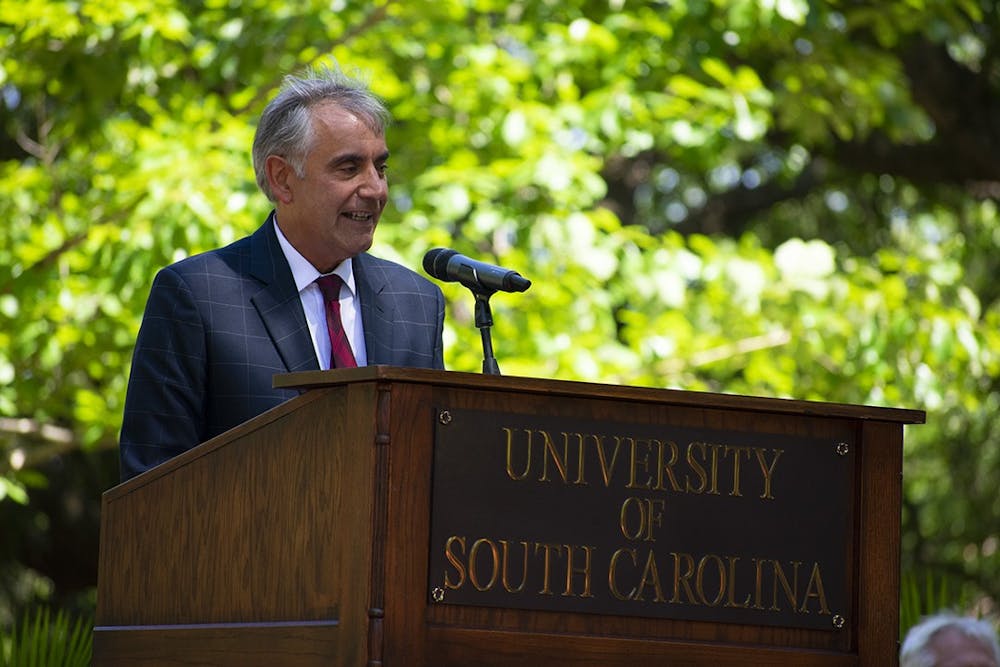The most important characteristic of any university leader is a focus on the well-being of students, faculty and staff. That's why it's essential for the USC community to hold interim university President Harris Pastides accountable throughout his tenure.
Following the controversy and national attention surrounding former President Bob Caslen's resignation, students seemed excited to see Pastides returning to the President’s House. The popular USC Barstool account described Pastides as “not the hero we deserve, but the hero we need right now” on Twitter, and he was clearly a popular figure on campus when he retired in 2019.
However, the sheen of popularity hides an unfortunate truth: Pastides is not quite as good as his reputation is.
For example, take how Pastides handled USC's sexual harassment crisis. While Caslen faced the brunt of student protests against the administration’s inaction toward some allegedly abusive faculty and staff members, many of the known instances of harassment actually happened under Pastides’ previous administration.
According to FITSNews, Pastides was personal friends with David Voros, a painting professor in the School of Visual Arts and Design who allegedly harassed students and other faculty members. Despite this conflict of interest, Pastides dismissed former student Allison Dunavant’s complaint against Voros.
Since then, multiple other women have sued USC, alleging that Voros harassed them, as well.
Despite these lawsuits and allegations, David Voros and Robert Richmond still remain on university payroll.
Additionally, Pastides is currently refusing to move forward in the effort to rename buildings named after racists and slaveowners. Even though the Presidential Commission on University History recommended 11 buildings on campus to be renamed (and even suggested deserving replacement namesakes), Pastides decided not to forward the recommendation to the university board of trustees.
Pastides cited South Carolina's Heritage Act for this decision, which is a state law that requires a legislative vote to rename certain historical buildings or monuments. However, the status of this law is not certain: A lawsuit heard by the South Carolina Supreme Court this May argued that it violates the state constitution. While he awaits the court's decision, Pastides might as well have moved forward with the renaming process, so that USC would be ready if the law is found illegal.
Ultimately, there is no reason for our campus to honor the names of people who fought to maintain slavery, defended segregation and even signed the Constitution of the Confederacy.
Despite these shortcomings, Pastides has made decisions to protect our community, such as his decision to require masks inside campus buildings. After all, he has a Ph.D. in epidemiology from Yale and knows what he’s talking about when it comes to infectious diseases.
You might notice many of the criticisms of Pastides were also common criticisms of Caslen. This raises the question: What actually explains the difference in popularity between these two university leaders?
Likely, it’s their personas – not their policies. Pastides is known for his personable Mini Cooper rides around campus, while Caslen came to USC in the middle of the scandal and controversy surrounding his appointment – not exactly an endearing introduction.
As nice as it is to have a friendly president once again, it doesn’t really matter. At the end of the day, the most important thing is that USC’s president focuses on the interests of USC’s community. This is something neither Pastides nor Caslen always did.
With Caslen gone and Pastides back, at least temporarily, students, faculty and staff must hold him, his administration and the board of trustees accountable as our university employs professors accused of abusive behavior, fails to deal with its racist past and tries to navigate the highly contagious COVID-19 delta variant.
Pastides, and whoever replaces him as university president, must be willing to prioritize student, faculty and staff interests. If they don’t, then that responsibility falls into our hands – we must demand an administrative system where the USC community actually holds power over our university.

